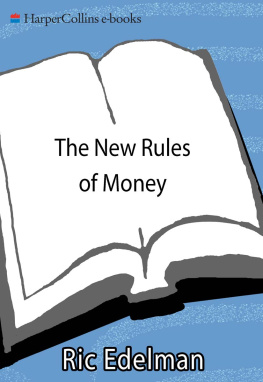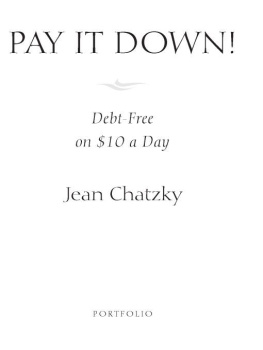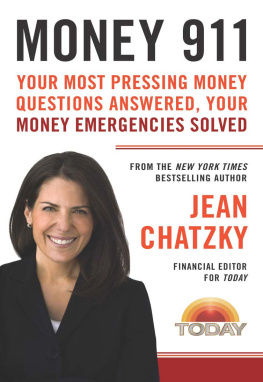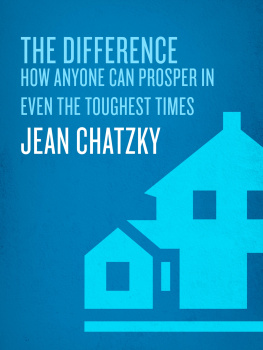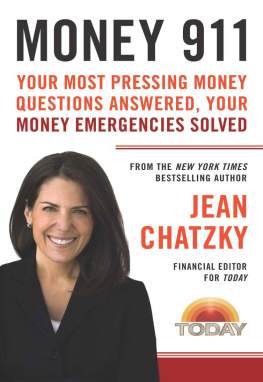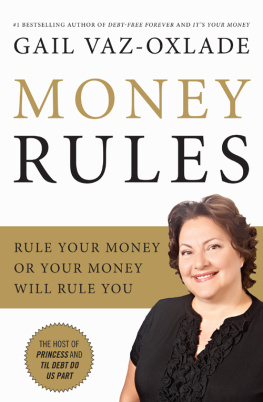


For my parents, who taught me the rules, my husband, who helps me keep them, and my kids, who I hope will (someday) know them by heart.
Contents
Introduction
You worry about your money. Most people do. Youre concerned that there isnt enough of it for todayand even more concerned that there wont be enough to get you through tomorrow. Statistics show that 50 percent of people will run out of money in retirement. Thats half of the retired population. Thats terrifying.
And that wont be you.
Why not? Its very simple: If you follow the rules in this book, you will have a lifetime of financial security and eliminate most, if not all money stress.
I know this because Ive spent the past quarter century knee-deep in the world of people and their money. Ive watched how we make it, save it, spend it, borrow it, invest it, and protect it. And I can tell you that there arent that many things separating the people who succeed financially from those who blow it.
The folks who succeed do a few elemental things over and over. They adhere to a concrete and simple set of Money Rules. Because they do, their financial futures are not in jeopardy. They dont have to worry about having enough cash to pay their bills, save for tomorrow, and take care of their familiesbecause they will. They dont have to worry about running out of money in retirementbecause they wont.
You can be one of these people.
To understand whats been holding you back, simply answer the following question: How would you describe your relationship with money?
I asked a random sample of Americans that question and heres what they said: Confusing. Frightening. Criminal. Chaotic. Stressful. Unstable. Precarious. Necessary evil. Unnecessarily complex.
Those negative feelings present a big problem. When youre frightened of something, the human tendency is to retreat rather than tackle. And retreating from your finances is something you cant afford to do.
You are much more responsible for your own finances than previous generations. They had pensions provided by corporations and managed by pros. You have a 401(k) to manage yourself. They had health insurance that camegratis with their jobs. You are being asked to contribute more for that coverage every year. They had confidence that Social Security and Medicare would last as long as they did. Many of us (maybe even most of us) do not.
Over the years, I have been told that the thing Im best at is taking complicated financial subjects and putting them in words the average Joe or Jane can understand. I think I can do this because I am that average Jane. Im not an economist or a financial advisor or a CPA. Im a journalistas well as a consumer, small-business owner, employee, client, taxpayer, homeowner, wife, ex-wife, mother, daughter, sister, and friend. Whenever I tackle a new investment or insurance policy or piece of tax code, I am aiming to understand it well enough to make use of it in my own life. And once Ive done that, I can help you understand it, too.
Getting to the bottom of these things has become a part of my DNA. Thats why when the president announces that hes got a new program to help students deal with their overwhelming student loan debts, or massive numbers of people want to leave their banks after the addition of a new layer of fees, youll often find me on TV teaching youstep by stephow to deal. The problem is that between the speed at which were living and the frequency with which these financial changes (changes in laws, changes in fees, changes in everything) are coming at us, sometimes things fall through the cracks.
We need simplicity. A means of looking at most of the money decisions were asked to make and being able to say: Yes. Or no.
That simplicity is possible.
Over my career, Ive come up with a set of Money Rules that I follow (and tell others to follow) religiously. And Im not the only one. Financial advisers, analysts, bankers, accountants, lawyers, as well as plenty of smart people in nonfinancial professions have their own Money Rules.
This book pulls them together. First, I made my own list. Then I collected from others. Then I vetted both. I got rid of the ones that didnt make sense and the ones that didnt hold water. I got rid of the ones that just didnt feel right. In fact, I got rid of more rules than I held onto. Youll see the ones that passed all of my tests on the pages that follow.
Some rules are self-explanatory. For those that arent, Ive included the logic. Its important to understand why these rules are rules. You will be better off if you never pull money out of your 401(k) before you retire, just as you will be better off if you never shop angry. Those are facts. But if you understand why, youre more likely not just to commit the rules to memory but also to stick by them because they make so much sense.
But before you read on, there are two guiding principles I want you to think about. These will color what you take away from the rules in the sections that follow.
Principle #1:
Personal finance is more personal than it is finance.
You have to make the decisions that are right for younot right for your best friends or your siblings or even your motherbut right for you and for your family. That may mean leaving cash in the bank because it enables you to sleep at night while the experts are telling you to invest that money so it can grow. It may mean taking a lower paying job because you think youll actually enjoy the work. It may mean deciding youll work a few extra years because you cant stand the thought of loading up your kids with student loans. Whatever personal choices you make, make them thoughtfully and with a plan to get you from here to there. Thats key, because along the way, I guarantee there will be stops and starts. There will be emergencies and surprises. And there will be people (sometimes people who love you) who think youre doing it all wrong. Thats because.
Principle #2:
Money is simplepeople make it complicated.
A persons behavior around money is emotional, sometimes nonsensical, often frustrating and maddening. Heres proof: If I were to take any other resourcewhether its a basic one like water or a luxury like a bottle of champagneand say Im going to divvy it up among you and a dozen of your colleagues, there would be a feeling that it should be split fairly. But if I say I have some extra money, theres more infighting involved. People start to ask, whos more or less worthy? Whos more or less needy? It becomes a value judgment. Theres morality associated with it. And, therefore, its much more complicated. Try to keep this in mind as you make financial decisions for yourselfand weigh in on the decisions of others.
So, lets get to it, remembering that these rules are brief on purpose. They are made to remove complexity and embrace simplicity. Theyre also easy to remember because if you can remember them, then you can follow them. And that is precisely the point.

PART 1
Next page

